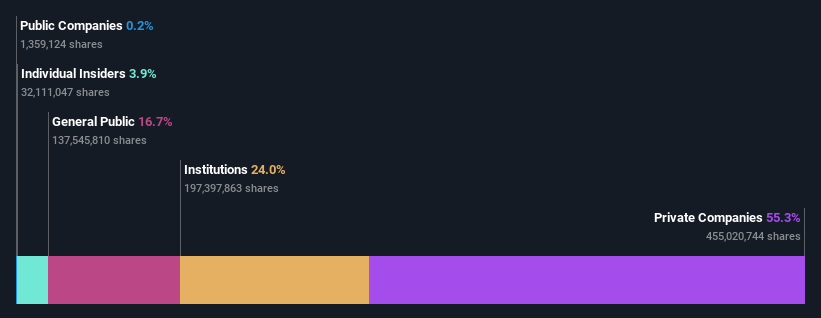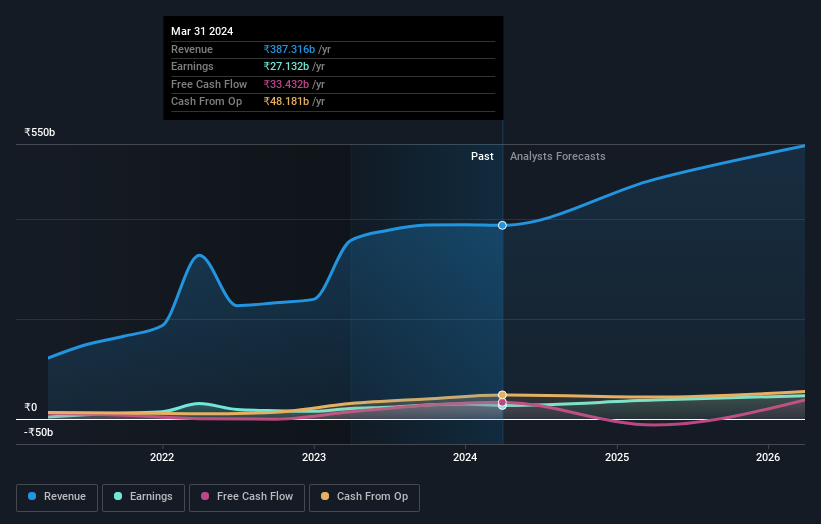- India
- /
- Metals and Mining
- /
- NSEI:JSL
Private companies who hold 55% of Jindal Stainless Limited (NSE:JSL) gained 3.5%, institutions profited as well

Key Insights
- Significant control over Jindal Stainless by private companies implies that the general public has more power to influence management and governance-related decisions
- 53% of the business is held by the top 7 shareholders
- Insiders have been selling lately
Every investor in Jindal Stainless Limited (NSE:JSL) should be aware of the most powerful shareholder groups. We can see that private companies own the lion's share in the company with 55% ownership. In other words, the group stands to gain the most (or lose the most) from their investment into the company.
Private companies gained the most after market cap touched ₹582b last week, while institutions who own 24% also benefitted.
Let's take a closer look to see what the different types of shareholders can tell us about Jindal Stainless.
Check out our latest analysis for Jindal Stainless

What Does The Institutional Ownership Tell Us About Jindal Stainless?
Institutional investors commonly compare their own returns to the returns of a commonly followed index. So they generally do consider buying larger companies that are included in the relevant benchmark index.
As you can see, institutional investors have a fair amount of stake in Jindal Stainless. This can indicate that the company has a certain degree of credibility in the investment community. However, it is best to be wary of relying on the supposed validation that comes with institutional investors. They too, get it wrong sometimes. It is not uncommon to see a big share price drop if two large institutional investors try to sell out of a stock at the same time. So it is worth checking the past earnings trajectory of Jindal Stainless, (below). Of course, keep in mind that there are other factors to consider, too.

Jindal Stainless is not owned by hedge funds. Looking at our data, we can see that the largest shareholder is Jsl Overseas Holding Ltd with 19% of shares outstanding. JSL Overseas Limited is the second largest shareholder owning 12% of common stock, and Virtuous Tradecorp Private Limited holds about 7.4% of the company stock.
On further inspection, we found that more than half the company's shares are owned by the top 7 shareholders, suggesting that the interests of the larger shareholders are balanced out to an extent by the smaller ones.
Researching institutional ownership is a good way to gauge and filter a stock's expected performance. The same can be achieved by studying analyst sentiments. There are a reasonable number of analysts covering the stock, so it might be useful to find out their aggregate view on the future.
Insider Ownership Of Jindal Stainless
The definition of company insiders can be subjective and does vary between jurisdictions. Our data reflects individual insiders, capturing board members at the very least. Management ultimately answers to the board. However, it is not uncommon for managers to be executive board members, especially if they are a founder or the CEO.
Most consider insider ownership a positive because it can indicate the board is well aligned with other shareholders. However, on some occasions too much power is concentrated within this group.
Our most recent data indicates that insiders own some shares in Jindal Stainless Limited. The insiders have a meaningful stake worth ₹23b. Most would see this as a real positive. It is good to see this level of investment by insiders. You can check here to see if those insiders have been buying recently.
General Public Ownership
The general public-- including retail investors -- own 17% stake in the company, and hence can't easily be ignored. While this group can't necessarily call the shots, it can certainly have a real influence on how the company is run.
Private Company Ownership
Our data indicates that Private Companies hold 55%, of the company's shares. It might be worth looking deeper into this. If related parties, such as insiders, have an interest in one of these private companies, that should be disclosed in the annual report. Private companies may also have a strategic interest in the company.
Next Steps:
It's always worth thinking about the different groups who own shares in a company. But to understand Jindal Stainless better, we need to consider many other factors. For instance, we've identified 1 warning sign for Jindal Stainless that you should be aware of.
If you would prefer discover what analysts are predicting in terms of future growth, do not miss this free report on analyst forecasts.
NB: Figures in this article are calculated using data from the last twelve months, which refer to the 12-month period ending on the last date of the month the financial statement is dated. This may not be consistent with full year annual report figures.
New: Manage All Your Stock Portfolios in One Place
We've created the ultimate portfolio companion for stock investors, and it's free.
• Connect an unlimited number of Portfolios and see your total in one currency
• Be alerted to new Warning Signs or Risks via email or mobile
• Track the Fair Value of your stocks
Have feedback on this article? Concerned about the content? Get in touch with us directly. Alternatively, email editorial-team (at) simplywallst.com.
This article by Simply Wall St is general in nature. We provide commentary based on historical data and analyst forecasts only using an unbiased methodology and our articles are not intended to be financial advice. It does not constitute a recommendation to buy or sell any stock, and does not take account of your objectives, or your financial situation. We aim to bring you long-term focused analysis driven by fundamental data. Note that our analysis may not factor in the latest price-sensitive company announcements or qualitative material. Simply Wall St has no position in any stocks mentioned.
About NSEI:JSL
Jindal Stainless
Manufactures and sells stainless-steel flat products in India and internationally.
Flawless balance sheet with high growth potential.


